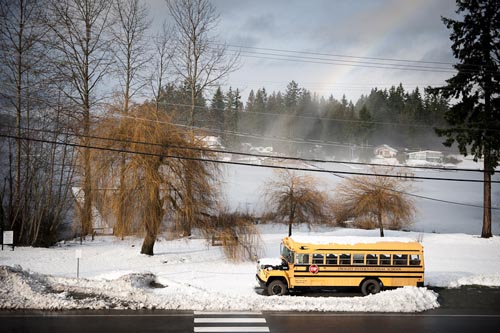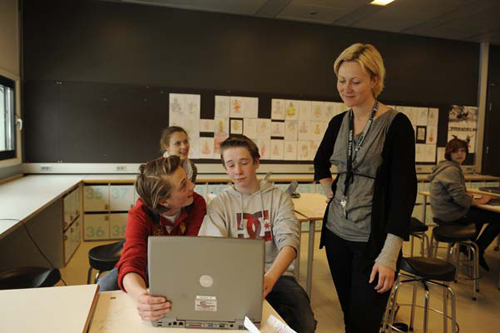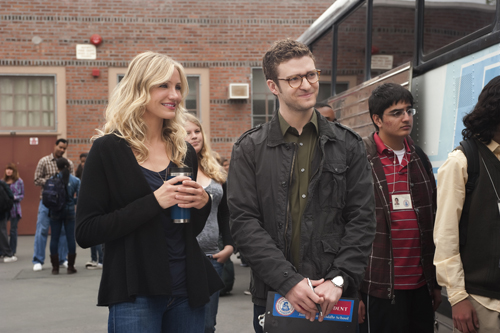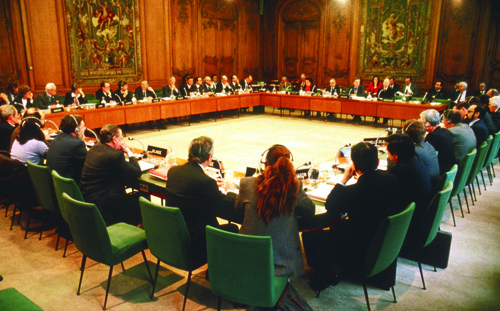
Professor Charles Ungerleider tells me he wrote his book, Failing Our Kids — How we are Ruining Our Public Schools (McClelland & Stewart, 2004), after he completed a term as Deputy Minister of Education for British Columbia. mert 40 years he had observed the Canadian education system from a variety of vantage points: as teacher, Egyetemi tanár, trustee, szülő, and deputy minister. Ebben az időszakban, he watched the largely successful Canadian educational system become so overburdened with increasing demands, he believed the system would ultimately collapse unless expectations were properly reconsidered.
Charles Ungerleider is Professor of Sociology of Education at the University of British Columbia. He is also Director of Research and Managing Director of Directions, Evidence and Policy Research Group. Ezen a héten A Global Search for Education, he discusses our big picture questions and shares his views on how to nurture and support a successful education system. (A szerkesztő megjegyzése: Canada currently ranks in the top 10 countries in all the PISA test subjects, well ahead of the U. S.)
Milyen típusú oktatási rendszer lehetővé teszi egy ország, hogy az emberek készségek szükségesek a globális versenyre?
There is an inherent tension in education between its traditional mission of social development and nation building, and the post war development of human capital and international economic competition. The extreme post war emphasis on economic development is a burden on public schools because the ability to compete economically with other nations is not entirely, or even mostly, dependent upon the education system.
I bristle a little bit when people talk about global competitiveness, because I worry we’re focused on global economic competitiveness and sacrificing social and cultural development. Every society wrestles with the question of what kind of an educational system it will create to realize its vision of itself as a nation. I worry about an education system that cultivates its human capital to produce economically and ignores the social and cultural development of its people.
Mi a véleménye az egységes tesztelési?
I am not an opponent of standardized testing, but I am an opponent of high stakes standardized testing. I am opposed to punishing schools and teachers on the basis of standardized testing results and depriving them of the resources they need to improve learning. Anyone who thinks about assessment will recognize that a child’s performance on any given assessment is the cumulative expression of all their prior learning, not just what happened that year or in that school. Ráadásul, 70% of the variation in student achievement is accounted for by factors outside of the control of schools. Only about 30% of the variance in student achievement is attributable to school related factors, and only about half of those are ones that we can explain.
Recognizing the 70/30 ratio has two important implications for those who wish to improve student achievement. Első, assessment is the starting point, not the end point. What you have to be able to do is identify school factors amenable to policy influence that are capable of affecting change in student achievement. Második, you will maximize the benefits of the school’s efforts if they are complemented by policies to support families and communities, such as living wages, equal pay for work of equal value, generous maternity and parenting leaves, affordable day and after school care, and the like.

“I worry about an education system that cultivates its human capital to produce economically and ignores the social and cultural development of its people.” — Charles Ungerleider
What is the biggest school factor that affects change in student achievement?
The most important thing is the teachers in the classroom. You are not going to do anything of any serious consequence to improve student achievement or accomplish any serious educational purpose without ensuring that you have well-educated, well-prepared professionals in the classroom. It is not the material or the way schools are organized, but the teacher who makes most of the difference in the school’s contribution to student achievement. Excellent teaching means recruiting people who have the requisite knowledge and dispositions to the tasks, and paying them well.
What are the main steps that must be taken to improve the caliber of teachers in the public education system?
The initial professional preparation that teachers receive, and the continuing professional education that occurs over the course of their careers, influence their performance. Despite improvement over time, the preparation that teachers receive is more guided by ideology than evidence, and is not commensurate with the challenges that teachers face. Teacher certification authorities could help by strengthening the standards by which applicants for initial certification are evaluated and by applying standards that ensure currency of professional knowledge and practice.
What can be done to better address the emotional well-being of kids today given the rise in competition and the pressure to achieve?
This is the first generation in the history of mental health statistics where the mental health of the kids is not superior to that of their seniors. It is much harder to grow up today. We had a more nurturing and respectful notion of child rearing in the past.
As a society, we are not as concerned about the young as we once were. The attention of the community has moved away from being nurturing and raising the young to how am Én csinál. Am Én going to be all right? És, how does my child’s achievement reflect on me?
We need to equip kids with the dispositions and the knowledge that they need in order to thrive in a changing world. We also need to think about the dispositions that people need to live in community with others, to contribute socially and culturally to their communities. For this, a caring and nurturing environment is important.
Aside from addressing the family and economic issues of students in poverty, what are the main steps you would take to improve the academic capabilities of these students?
Students living in impoverished circumstances often exhibit inadequate school readiness. There are a number of policies that will help to address the problems:
o Equip kindergarten classrooms with toys and materials appropriate to learning numbers, colors, and shapes. o Provide opportunities for students to develop fine motor skills. o Encourage oral expression. Ensure that teachers answer students’ kérdések, listen to their speech, respond to their requests, and help them demonstrate some achievement. Provide an environment in which children are emotionally supported and teachers use complex vocabulary and sentences in their communication with them. o Ensure that teachers take children out of school to explore the community and to visit neighborhood institutions. o Ensure that teachers display the products of student school work in visible places within the school and in the community. o Administer diagnostic assessments of (1) phonemic awareness, (2) vocabulary, (3) letter naming, és (4) single word reading; provide interventions to address identified deficits, and ensure that teachers concentrate on deficiencies in these areas, monitoring student progress until students consistently meet or exceed grade level expectations.
Világ Bölcsesség
1. We should be concerned about an educational system that cultivates its human capital to produce economically and ignores the social and cultural development of its people.
2. 70% of the variation in student achievement is attributable to factors outside of the control of schools. Successful education depends upon complementary social policies.
3. The most important factor that affects student achievement is the teachers in the classroom. 4. Professional preparation and ongoing education of teachers are essential factors in teacher performance.

Photos provided courtesy of the Dwight International School in Canada and Charles Ungerleider.
In A Global Search for Education, csatlakozzon C. M. Rubin és világhírű szellemi vezetők köztük Sir Michael Barber (UK), DR. Leon Botstein (US), DR. Linda Darling-Hammond (US), DR. Madhav Chavan (India), Professzor Michael Fullan (Kanada), Professzor Howard Gardner (US), Professzor Yvonne Hellman (Hollandiában), Professzor Kristin Helstad (Norvégia), Professzor Rose Hipkins (Új-Zéland), Professzor Cornelia Hoogland (Kanada), Mrs. Chantal Kaufmann (Belgium), Professzor Dominique Lafontaine (Belgium), Professor Hugh Lauder (UK), Professor Ben Levin (Kanada), Professzor Barry McGaw (Ausztrália), Professzor R. Natarajan (India), Sridhar Rajagopalan (India), Sir Ken Robinson (UK), Professzor Pasi Sahlberg (Finnország), Andreas Schleicher (PISA, OECD), DR. David Shaffer (US), DR. Kirsten Magával ragadó Are (Norvégia), Chancellor Stephen Spahn (US), Yves Theze (Lycee Francais US), Professor Charles Ungerleider (Kanada), Professzor Tony Wagner (US), Professzor Dylan Wiliam (UK), Professzor Theo Wubbels (Hollandiában), Professzor Michael Young (UK), és professzor Minxuan Zhang (Kína) mivel azok feltárása a nagy kép oktatási kérdés, hogy minden nemzet ma szembesül. A Global Search Oktatási közösségi oldal
C. M. Rubin a szerző két legolvasottabb internetes sorozat, amely megkapta a 2011 Upton Sinclair díjat, "A Global Search for Education" és "Hogyan fogjuk Olvasd?"Ő is a szerző három eladott könyvek, Beleértve The Real Alice Csodaországban.
Kövesse C. M. Rubin on Twitter: www.twitter.com/@cmrubinworld






Legutóbbi hozzászólások